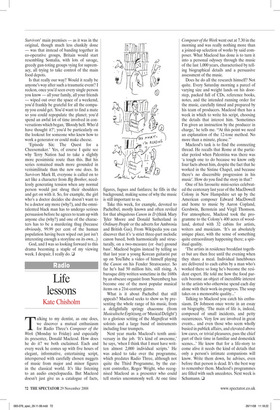Life lessons
Kate Chisholm
Talking to my dentist, as one does, we discover a mutual enthusiasm for Radio Three’s Composer of the Week (Monday to Friday) and especially its presenter, Donald Macleod. How does he do it? we both exclaimed. Each and every week he comes up with five hours of elegant, informative, entertaining script, interspersed with carefully chosen nuggets of music from major and minor figures in the classical world. It’s like listening to an audio encyclopaedia. But Macleod doesn’t just give us a catalogue of facts, figures, fugues and fanfares; he fills in the background, making sense of why the music is still important to us.
Take this week, for example, devoted to Pachelbel, mostly known and often reviled for that ubiquitous Canon in D (think Mary Tyler Moore and Donald Sutherland in Ordinary People or the adverts for Ambrosia and British Gas). From Wikipedia you can discover that it’s ‘a strict three-part melodic canon based, both harmonically and structurally, on a two-measure (or -bar) ground bass’. Macleod begins instead by telling us that last year a young Korean guitarist put up on YouTube a video of himself playing the Canon on his Fender Stratocaster. So far he’s had 50 million hits, still rising. A baroque ditty written sometime in the 1680s by an obscure organist from Nuremberg has become one of the most popular musical items on a 21st-century gizmo.
What is it about Pachelbel that still appeals? Macleod seeks to show us by presenting the whole range of his music, from a delightfully springy chaconne (from Musicalische Ergötzung, or ‘Musical Delight’) to a glorious setting of the Magnificat with soloists and a large band of instruments including four trumpets.
Next year marks Macleod’s tenth anniversary in the job. ‘It’s kind of awesome,’ he says, ‘when I think that I must have written almost 2,000 individual scripts.’ He was asked to take over the programme, which predates Radio Three, although not quite the Third Programme, by the current controller, Roger Wright, who recognised Macleod as a presenter who could tell stories uncommonly well. At one time Composer of the Week went out at 7.30 in the morning and was really nothing more than a joined-up selection of works by said composer. What Macleod has done is to turn it into a personal odyssey through the music of the last 1,000 years, characterised by telling biographical details and a persuasive assessment of the music.
Does he do all the research himself? Not quite. Every Saturday morning a parcel of varying size and weight lands on his doorstep, packed full of CDs, reference books, notes, and the intended running order for the music, carefully timed and prepared by his team of producers. Macleod then has a week in which to write his script, choosing the details that interest him. ‘Sometimes I’m given an instruction by the producer in charge,’ he tells me. ‘“At this point we need an explanation of the 12-tone method. No more than a minute, please.”’ Macleod’s task is to find the connecting thread. He recalls that Rome at the particular period when Palestrina was there was ‘a tough one to do because we know only four facts about him, despite the fact that he worked in the Sistine Chapel, and because there’s no discernible progression in his music’. How do you find the story in that?
One of his favourite mini-series celebrated the centenary last year of the MacDowell Colony in New Hampshire set up by the American composer Edward MacDowell and home to music by Aaron Copland, Gershwin, Bernstein and Virgil Thomson. For atmosphere, Macleod took the programme to the Colony’s 400 acres of woodland, dotted with 32 cabins for artists, writers and musicians. ‘It’s an absolutely unique place, with the sense of something quite extraordinary happening there; a spiritual quality.
‘The artists in residence breakfast together but are then free until the evening when they share a meal. Individual lunchboxes are delivered to each cabin by a man who’s worked there so long he’s become the resident expert. He told me how the food parcels become an object of incredible interest to the artists who otherwise spend each day alone with their work-in-progress. The soup takes on a memorable quality...’ Talking to Macleod you catch his enthusiasm. Dr Johnson once wrote in an essay on biography, ‘The main of life is, indeed, composed of small incidents, and petty occurrences. Very few are involved in great events... and even those who seem wholly busied in publick affairs, and elevated above low cares, or trivial pleasures, pass the chief part of their time in familiar and domestick scenes...’ He knew that for a life-story to come alive it needs the kind of details that only a person’s intimate companions will know. Write them down, he advises, even before that person is dead. It’s the best way to remember them. Macleod’s programmes are filled with such anecdotes. Next week is Schumann. ❑


































































































 Previous page
Previous page